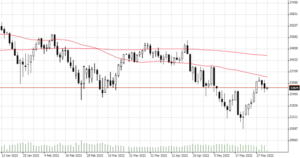

02.06.2022 – That’s real power: a single manager sinks the market. But is the warning from Jamie Dimon, head of JPMorgan, enough to put a lasting halt to the recent rally? Only if he’s right. The investment banker sees the Federal Reserve tightening and the Ukraine war as threats to the market. He was joined by two other influential cautioners.
It can happen that quickly: Wall Street has interrupted its recent countermovement and reset first. The Dow Jones stopped just below the 50-day line, above which the 200 average continues to beckon. So far, this is only a small setback in the daily chart. But perhaps this is a harbinger of more to come.

Source: Bernstein Bank GmbH
Warning of the hurricane
That’s what it was all about: Dimon warned that a hurricane was brewing in the economy. He literally said yesterday at a financial conference sponsored by AllianceBernstein in New York City: “I said there were storm clouds, big storm clouds. It’s a hurricane. (…) Right now it’s kind of sunny, things are doing fine, everyone thinks the Fed can handle it. That hurricane is right out there down the road coming our way. We don’t know if it’s a minor one or Superstorm Sandy. You better brace yourself.”
Fed and Ukraine war
In other words, we may be experiencing the calm before the storm. Lots of sunshine, beautiful weather – and soon it will crash. The head of JPMorgan blamed two events in particular for the possible coming catastrophe: First, the Federal Reserve’s plan to shrink its balance sheet – quantitative tightening will have consequences for the financial market. “We’ve never had QT like this, so you’re looking at something you could be writing history books on for 50 years,” CNBC reported. The background: the Fed will let $47.5 billion worth of bonds expire this month. That monthly rate will double to $95 billion in September.
The second storm factor, he said, is the war in Ukraine and the impact on commodity prices, especially oil and gasoline. The price of a barrel of oil could reach $150 or $175 a barrel, he said.
Wells Fargo and Atlanta Fed
They were joined by two other bearish speakers. Charlie Scharf, Group CEO of the major bank Wells Fargo, reiterated his assumption that higher interest rates are likely to slow down the economy – and that a soft landing would be difficult to achieve. Ergo: looming recession.
Further, Raphael Bostic, head of the Atlanta Fed, recaptured his recent statement that the Fed could pause on rate hikes in September. In an interview with “Marketwatch”, he stressed that his statement could not be interpreted as an announcement that the Fed will save the market. So as you can see, you need to keep a constant eye on the realtime news. Bernstein Bank wishes you successful trades and investments!
Important Notes on This Publication:
The content of this publication is for general information purposes only. In this context, it is neither an individual investment recommendation or advice nor an offer to purchase or sell securities or other financial products. The content in question and all the information contained therein do not in any way replace individual investor- or investment-oriented advice. No reliable forecast or indication for the future is possible with respect to any presentation or information on the present or past performance of the relevant underlying assets. All information and data presented in this publication are based on reliable sources. However, Bernstein Bank does not guarantee that the information and data contained in this publication is up-to-date, correct and complete. Securities traded on the financial markets are subject to price fluctuations. A contract for difference (CFD) is also a financial instrument with leverage effect. Against this backdrop, CFD trading involves a high risk up to the point of total loss and may not be suitable for all investors. Therefore, make sure that you have fully understood all the correlating risks. If necessary, ask for independent advice. CFDs are complex instruments and are associated with the high risk of losing money quickly because of the leverage effect. 68% of retail investor accounts lose money trading CFD with this provider. You should consider whether you understand how CFD work and whether you can afford to take the high risk of losing your money.7
